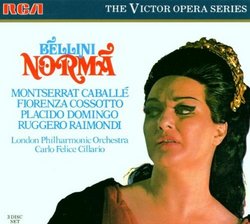| All Artists: Bellini, Caballe, Cossotto, Lpo, Cillario Title: Norma (Complete) (Ger) Members Wishing: 0 Total Copies: 0 Label: RCA Victor Europe Original Release Date: 1/1/1987 Re-Release Date: 10/1/1987 Album Type: Import Genre: Classical Style: Opera & Classical Vocal Number of Discs: 3 SwapaCD Credits: 3 UPCs: 035628650221, 035628650221 |
Search - Bellini, Caballe, Cossotto :: Norma (Complete) (Ger)
CD Details |
CD ReviewsMy First Norma Recording Scott Jelsey | Houston, TX United States | 06/09/2004 (5 out of 5 stars) "This was my first Norma recording, which I bought in the late 80's. I have about six now, but this is still one of the best overall. Caballe is in mint condition here and very dramatic. All she lacks is a convincing trill, but when so much else is right, it's an easy fault to forgive. This is one of Domingo's very best recordings. His highest register has a security that would not remain long after he began singing Otello a few years later. Cossotto sings a very Verdian sort of Adalgisa, which is quite intense, if probably not quite bel canto in style. She blends seamlessly with Caballe in their duets. Raimondi is in imposing voice - luxury casting for the smallish role of Oroveso. Cilario lets the music breathe, and the London Philharmonic is top notch all the way. The recorded sound is quite vivid, if a little lacking in the treble. Highly recommended as a supplement to the Callas, Sutherland or Scotto recordings." Refined Bel-Canto Singing Viewer | 05/22/2006 (5 out of 5 stars) "Norma, as heard on this recording, is one of the most beautiful things to have been written! The title-role is taken by Montserrat Caballe. She sings with perfect bel-canto style without avoiding dramatic tributes here and there. The "younger" Adalgisa is Fiorenza Cossotto (I think they're realy more or less the same age). Besides few places where she is carried away by her instincs of a dramatic-mezzo and spits an earth-quaking note (most often at the bottom) she puts a credible performance. Unlike Stignani and Ludwig in Callas' recordings Cossotto is able to sing the duet "Mira, o Norma" in the original key! Pacido Domingo as Pollione is super-confident of his high range, and Raimondi seems to fit the role of Oroveso more than many dramatic bass-roles he used to sing (I actually prefer him as a bariton when the dramatic repertoire is concerned, like his Escamillo or Scarpia). The choir corresponds well to Norma's "guerra" shoutings, and the orchestra led by the not very familiar (at least not to me) Cillario plays very well indeed. I have no affection for Bellini's opera, but this set I do like!" The Best "Complete" Recording of Norma The Cultural Observer | 02/15/2007 (5 out of 5 stars) "Norma is one of my favorite operas, and my favorite Norma is Maria Callas. That said, all of the Normas that Maria Callas sang were cut, and although much of the opera is still intact in her many recordings, some of the moments which make this opera so exciting are lost when the score goes under the knife. The most famous of the complete recordings of Norma is one done by the Sutherland-Bonynge-Horne team, and although people heap a ton of praise on that recording, I have never found it globally satisfying because in my opinion, the sound of Joan Sutherland's voice will never approach the quality of a great Norma. She definitely has the high notes, and it is quite impressive to hear a magnificent voice sing the aria and the duets in their original keys...but that does not make a great Norma. A great Norma needs to have the temperament and the metal and at the same time, a degree of tenderness to make this part work for the voice and the theater. The theater, and to a certain degree, Joan's voice, did not work completely to make Norma truly hers.
This recording features another great Norma, Montserrat Caballe, who is in my opinion the only true Norma after Callas. She has all the notes except for the very highest ones (like D flats), and she also makes Norma a creation of her own without any qualities copied from Callas' performances. She also sings very beautifully and with drama, and her Casta Diva is perhaps the most beautiful version I've heard after Callas. I simply adore her duets with Adalgisa and Pollione. The vengeance trio is simply perfectly executed, and so is the final Pollione encounter and the pathos-filled finale with Oroveso. A perfect performance of the Druid priestess, to put it short. The Adalgisa here is Fiorenza Cossotto, who has one of the most youthful and beautiful voices ever recorded for the part. Her high notes are splendid, and her sense of drama prevents the great Verdi mezzo titan in her from affecting her sweet portrayal of this role. The Pollione is Placido Domingo, who burnishes the part of the Roman general with clarion tone and a lot of sensitivity. His is perhaps the best performance after Franco Corelli's perfect Pollione from EMI. One can say that Ruggero Raimondi doesn't have the gravitas of Zaccaria or Rossi-Lemeni, but that is a minor quibble in what is essentially the best complete Norma on records. Carlo Felice Cillario phrases the Bellinian well, but without the mastery of Serafin. For the best Norma, you would still have to turn to Callas." |

